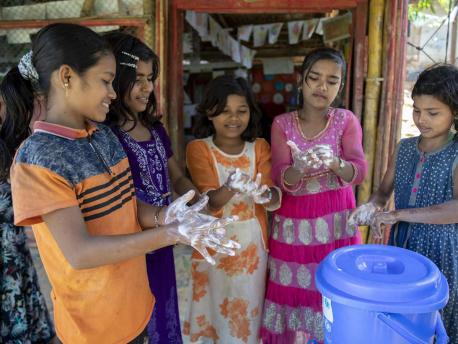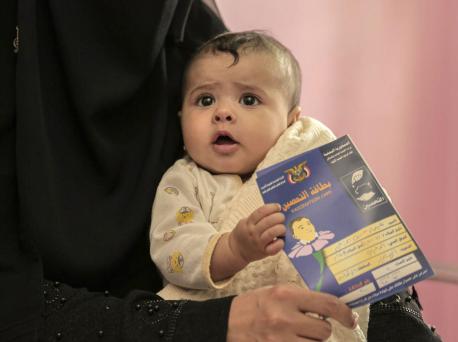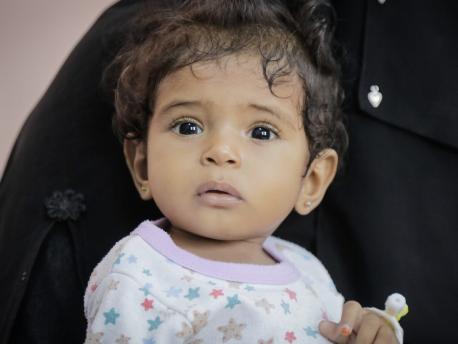
In Bangladesh, Rohingya Refugees Celebrate Ramadan
Despite the threat of the novel coronavirus, ethnic Muslim Rohingya refugees will spend their holy month fasting and praying.
Observing Ramadan without fear of reprisal is a relatively new concept for the more than 850,000 Rohingya refugees now living in one of the world's largest refugee camps, in the Cox's Bazar District of Bangladesh. Before they were chased out of Myanmar's Rakhine State by a military crackdown in 2017, the Muslim minority Rohingya prayed in secret or risked arrest. In Cox's Bazar, mosques have sprung up in the crowded encampments, and no military forces threaten to disrupt their fasting, prayer and study of the Quran.
Here we can pray.
"It feels good to do that," Jafor Alam told a reporter during his first Ramadan in Bangladesh in 2018. "Here we can pray."

A family breaks sunset fast during Ramadan in Modurchara Camp 5, part of the sprawling Rohingya refugee settlement in Cox's Bazar, Bangladesh on June 4, 2018. © UNICEF/UN0219105/Modola
This year, a new threat looms over Cox's Bazar: COVID-19. Large gatherings have been prohibited to prevent the spread of the virus, but for the families living in the densely packed sea of bamboo and tarpaulin shelters, sharing water and sanitation facilities, social distancing is easier said than done. Their best defense against the spread of infectious diseases is coughing hygiene and regular, thorough handwashing.
UNICEF water, sanitation and hygiene programs help Rohingya refugees protect themselves from the spread of disease
Two and a half years ago, Rohingya children arriving in the camps had little or no access to basic water or sanitation facilities. UNICEF and partners moved quickly to establish basic water, sanitation and hygiene (WASH) services, helping to contain the risk of a major disease outbreak.
By the end of 2019, UNICEF had also set up around 2,500 learning centers, each equipped with a handwashing station providing soap and clean water, making it possible to reach hundreds of thousands of Rohingya children with lessons on good health and hygiene — including how to wash their hands properly.
#Handwashing has been a part of the curriculum in learning centers since the beginning of #Rohingya#refugee crisis.
— UNICEF Bangladesh (@UNICEFBD) April 11, 2020
Today, this knowledge is critical in preventing the spread of #COVID19 in the camps.
--@JapanGov, @europeaid, @EUinBangladesh & @SwissHumAidUnit for the support. pic.twitter.com/K4PyUhSW7n
Even though learning centers have been temporarily closed as a precaution against COVID-19, UNICEF continues to distribute reliable information and essential supplies through WASH programs, providing safe water and soap for around 240,000 Rohingya refugees, over half of whom are children.
UNICEF teams are also working with partners to scale up existing medical capacity, support training of medical staff, provide nutrition services for malnourished children, reunite missing children with their families and protect girls and women from gender-based violence. To keep Rohingya refugees learning during the pandemic, UNICEF is providing learning materials and activities to more than 200,000 children.

Almost nothing is left of the vegetation that once covered the hills, where Rohingya refugees live in the overcrowded camps of Cox's Bazar, Bangladesh. © UNICEF/UN0286424/Chakma
On March 24, authorities announced the first confirmed case of COVID-19 in Cox's Bazar District. As yet, no cases have been reported in the refugee camp, but testing is not widespread.
Despite all the difficulties, Rohingya refugees will observe the holy month of Ramadan fasting and praying. Finding food for the evening and early morning meals, at 6:30 PM and 3 AM, will be a challenge. Temperatures climb into the 90s in the daytime, making it hard to abstain from drinking or eating. There's no electricity to power a fan, and few trees to rest beneath during the hot, humid afternoons. Almost all of the trees have been cut down to build shelters, leaving little shade.

In Cox's Bazar, Bangladesh in 2017, 10-year-old Rohingya refugee Mohammed clutched two copies of the Holy Quran, the only belongings he had left after he fled mass ethnic violence in Myanmar. © UNICEF/UN0147324/Brown
And yet, Rohingya refugees in Cox's Bazar are grateful to spend the holy month engaged in prayer, daylight fasting and reading the Quran.
"In Myanmar, we were harassed a lot. Mosques were shut down. We weren't allowed to recite the Quran or pray," said Rashed, a Rohingya boy living in Kutupalong Refugee Camp. "To be a good Muslim, you have to learn the Quran and all our Islamic rules like giving alms to the poor so that everyone's equal, all the things Islam tells us to do so that we go to heaven."
Please donate now to help UNICEF keep vulnerable children safe and healthy during Ramadan.
Top photo: On March 9, 2020, children wash their hands with soap at a UNICEF-supported learning center in the Kutupalong camp, a Rohingya refugee camp, in Cox’s Bazar, Bangladesh. © UNICEF/UNI315489/Himu
HOW TO HELP
There are many ways to make a difference
War, famine, poverty, natural disasters — threats to the world's children keep coming. But UNICEF won't stop working to keep children healthy and safe.
UNICEF works in over 190 countries and territories — more places than any other children's organization. UNICEF has the world's largest humanitarian warehouse and, when disaster strikes, can get supplies almost anywhere within 72 hours. Constantly innovating, always advocating for a better world for children, UNICEF works to ensure that every child can grow up healthy, educated, protected and respected.
Would you like to help give all children the opportunity to reach their full potential? There are many ways to get involved.





